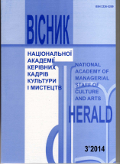PRIORITY OF THE FOLK INSTRUMENTAL ENSEMBLE PERFORMANCE
DOI:
https://doi.org/10.32461/2226-3209.3.2014.138130Keywords:
priority, performance, folk instruments, ensembleAbstract
The article is dedicated to the problem of priority in the context of modern musical culture. This term becomes widespread among spheres of theoretical and historical musicology. It is used as criteria of any scientific problem
evaluation in relation to actuality, scientific novelty, theoretical and practical meaning, id est, purposefulness of research on the whole. The deepest definition of this term it is assumed to accept the one, proposed by I. Kotlyarevskiy. Based on the main postulates of this definition, related to the theoretical and historical musicology, peculiarities of priority are considered in the area of art performance. Concretization of this term is demonstrated on the example of the folk instrumental performing genre.
This choice is due to the fact that folk instruments are the ancient ones and retain its timbre semantic and ethno
psychological specificity in regardless of genre and stylistic features of the repertoire. Noteworthy composers, performers and artistic director is that association of folk instruments ensemble composition helps to find unused resources of musically-artistic attainments. Therefore, at the present stage the ensemble performance acquires features of artistic and polylogical play. And this play moment, in turn, updates the resources of so-called instrumental theater.
The relevance of mentioned research object – the folk instrumental ensemble performance – requires deeper consideration of the proposed topic in terms of the notion of "priority", the essence of which, in turn, determines the
subject of study. The definition of "priority" relatively to performance genre and analysis under multi-level structure of this notion is the purpose of the research and makes scientific novelty of the problem.
Because of the object change of evaluation from the "scientific problem" to "performing genre" occurs the necessity of specific correction of "priority" definition in terms of its logical structure, as a result, its proposed the following
definition: Priority – it is a property of performing genre, which determined by the ratio of such components as relevance, novelty structure, creative perspective that collectively determine the purposefulness of this genre existing. Peculiarities of priority definition, concerning performing genre, have led to changes and explanation in its hierarchical structure. As a result, a "research institution" is transformed into "creative institution" (the extent of the necessity in creation of creative teams), "research team" – into the "creative team" (the availability of resources for future creative progress). The level called "single scientist" not only does not need the adjustment, but also does not make sense in the context of the topic.
The first two levels left with appropriate specification of the characteristics of priority: "world level" (the development of forms of creative activity which is necessary for optimization of human existence); level of "state" (the interest of the development of a certain performing genre).
In this context is proved the worthwhile and productive involvement into analytical and research terminology thesaurus the term "paradigm" in order to justify the dialectical relationship of theory and practice with regard to the
research of the existing level of development and further perspectives of socio-cultural operation for the selected unit of research – folk instrumental ensemble performance as a phenomenon of music culture. Natural paradigmatic "duality" allowed to cover two axes, which are the main vectors of bayan-ensemble genre analysis. First of all, it considers a theoretical axe – a set of musicological concepts to study of this kind of performance that as a result led to talk about the existence of a kind of music-theoretical system of so-called "bayan-knowing." On another hand – this is an objective axe, which is like a fundament in drawing up a coherent picture of the objective properties and characteristics of bayanensemble performance genre like the phenomenon of Ukrainian music culture.
In the defined context, the involvement into analytically-terminological thesaurus the research of term "paradigm" appears purposefulness and productive in order to justify the dialectical relationship of theory and practice regarding to the study of the existing level of development and socio-cultural perspectives of further operation of the selected unit of research – folk instrumental ensemble performance as a phenomenon of musical culture.
The analysis of folk instrumental ensemble performance has led to the regular conclusion that the availability of
resources for the further development of the creative team makes its relevance to organizational activity of creative or educational institution. This institution provides the productivity of team work and in such way solves current problems of music art and culture at the level of municipal needs. Every state, through strengthening its spiritual potential, creates and maintains an eidetic in the worldwide scale.
Downloads
Published
Issue
Section
License
Authors who publish with this journal agree to the following terms:
1. Authors retain copyright and grant the journal right of first publication with the work simultaneously licensed under a Creative Commons Attribution License International CC-BY that allows others to share the work with an acknowledgement of the work's authorship and initial publication in this journal.
2. Authors are able to enter into separate, additional contractual arrangements for the non-exclusive distribution of the journal's published version of the work (e.g., post it to an institutional repository or publish it in a book), with an acknowledgement of its initial publication in this journal.
3. Authors are permitted and encouraged to post their work online (e.g., in institutional repositories or on their website) prior to and during the submission process, as it can lead to productive exchanges, as well as earlier and greater citation of published work (See The Effect of Open Access).


